AN UNEXPECTED TREASURE AND AN UNCANNY EXPERIENCE
In my last blog I promised more “behind the scenes” stories from Bangladesh. I was there, if you remember, on leave from the University of Florida to work on a documentary for the Presbyterian Church, U.S. (For those of you new to my blog, for the full story please read part 1 through 12 of “The Gainesville Years.”) In this posting I would like to tell you about an unexpected treasure we came across when we went to film the harvesting of fish for the two new lakes being built in the refugee camp at Tongee. Our destination was one of the poorest, most densely populated areas of Bangladesh where, I was told, there were some 2400 people to a square mile.
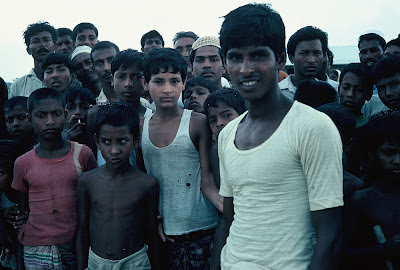 |
The men and boys from the village check us out.
|
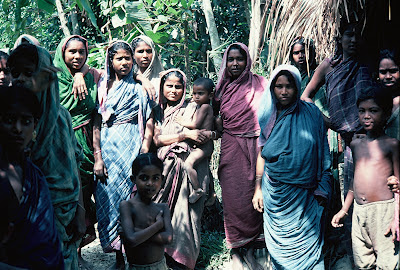 |
Village women take a moment from their unending
daily chores to watch some of our filming. |
The were no major cities in the area, just one small crowded village after another where daily life was a perpetual struggle for survival. It was hard to reconcile what I found there with the knowledge that this region had once been the heart of a thriving kingdom. And yet, for a brief time, beginning in the late 1500’s, what we know today as Bangladesh basked in a Golden Age. Known then as Bengal, it was a province of the mighty Mughal Empire. Under the Mughal viceroys art and literature flourished, overland trade was expanded, and ships came from all over the world to engage in commerce with Bengal’s merchants. In those days Bengal was the wealthiest area on the subcontinent. Its lush beauty was renowned, prompting European geographers to refer to the mouth of the Ganges as “Paradise.” I was reminded of that Golden Era when my crew and I came across a sight that seemed so incongruous in that village dotted countryside…a well preserved structure that looked like a grand palace.
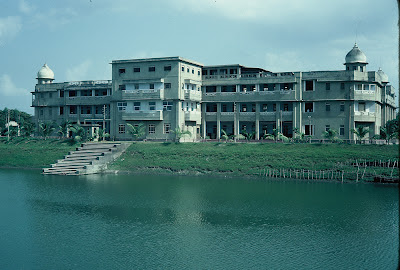 |
| The Sultan's Palace |
And that is precisely what it once was. As the story goes, sometime during the region’s Golden Age, before the Portuguese, Dutch, and French discovered the area...before the British turned their ventures in commerce into colonization… a wealthy sultan built this palace to house his many wives. To ensure his wives complete privacy when they partook of their ablutions—in other words, when they bathed—he built them a private lake adjacent to the palace.
During the Sultan’s reign it would have cost you your life if you were found anywhere near his lake. Knowing that made me wonder what the good Sultan would make of the fact that today his lake provides sustenance for hundreds of villagers in the area and—because of what was going on in Tongee—would soon be doing the same for refugees hundreds of miles away for many years to come.
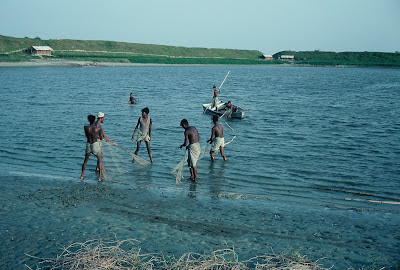 |
| Fishing in the Sultan's Lake |
But then I suppose what happened to his lake would not bother him nearly as much as what has happened to the beautiful, thriving countryside Bengal was when he built his castle.
Another story I would like to share with you is about a secret baptism my crew and I attended in the dark of night during a visit to a Muslim region deep in the center of the country. We had gone to the area to film scenes for a segment about how rice plants were being grown for replanting at the refugee camp at Tongee.
It was late afternoon when we arrived at the rice growing cooperative that had been set up by Christian missionaries. I could sense a certain tension in the air. People were hurrying about. Hushed conversations stopped abruptly when someone new approached. A woman called our translator aside and whispered something to her. The translator relayed the message: we were being invited to a special service... around midnight. To understand the importance and timing of the service, you need to know something about the co-op and the people who work in it.
Hunger was an ongoing problem in this area of Bangladesh. One of the main reasons was the area's culture, which was built around small family farms. Because Bangladesh had no mechanism to get crops to market, the farmers only grew enough food to feed their own families. In times past, before the population burgeoned, this culture worked well, but not now...not in today's densely populated region filled with landless people with no reliable sources for food.
The missionaries' project had succeeded in making great inroads in solving this ongoing problem of hunger. Using the latest agricultural technology, the cooperative was able to grow multiple crops of rice a year, providing both food and work for the area's landless people.
But in aiming for the highest yield for their crops, the missionaries crashed head-on into a major taboo: Since women have a more gentle touch than men, they are better at transplanting the delicate rice plants, so the missionaries sought out women for the task.
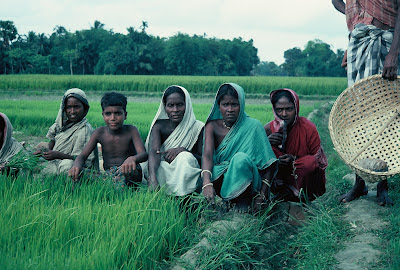 |
| Rice co-op workers in the field. |
They also wanted to help the countless number of widows produced by the country's devastating war for independence. The problem was that in the Muslim culture women are not permitted to work except for their husbands or fathers. If they do not have a husband or a father to protect and provide for them their only religiously-sanctioned option for survival is to beg.
This option did not sit well with many of these women, so they chose to go against religious law, and at considerable risk to their standing in their community, work for the cooperative. Allowing this put the Missionaries at odds with the Muslim leaders in the community. To compound the problem, many of these women, happy to be given this opportunity to survive with dignity, looked upon the religion of these missionaries as more suited to their needs than their own Muslim faith. But to convert could mean a death sentence for them. Baptisms had to be done in secret. And that is how my crew and I came to be guests (without cameras of course) at a secret midnight baptism, complete with look-outs and guards to warn of interlopers.
It was an intense, unforgettable experience. I only hope the daring women who took this step that night found sufficient solace in their new faith to warrant the ongoing danger in which they had put themselves.
NEXT: FAREWELL BANGLADESH, HELLO INDIA – HEADING HOME








No comments:
Post a Comment